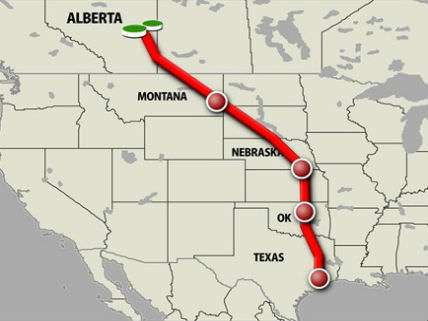EPA Hates On the Keystone XL Pipeline: Gives Obama an Excuse to Deny Construction Permit
A novel idea: Why not let the builders decide whether or not it is economic to construct?

Yesterday, the Environmental Protection Agency released its letter to the U.S. State Department in which it outlined its objections to approving the construction of the Keystone XL pipeline. That pipeline would transport daily more than 800,000 barrels of crude oil derived from Canadian oil sands to Gulf Coast refineries. The State Department is involved because the president has the authority to rule on whether such cross border projects are in the "national interest" or not. Big surprise! The EPA thinks its not because the carbon dioxide emissions from producing and burning the petroleum from the project would contribute to man-made global warming.
In addition, the State Department's initial evaluation concluded that the market for oil sands crude was so strong that it would be produced and shipped in more expensive and environmentally deleterious ways - mainly by rail cars - if the pipeline were not approved. Since approval for the project has been delayed for about six years, oil prices have fallen steeply. The EPA now observes:
The Final SEIS [Final Supplemental Environmental Impact Statement] concluded that given global oil prices projected at that time this difference in shipment costs would not affect development of oil sands, which would remain profitable even with the higher transportation costs of shipment by rail. Therefore, the Final FEIS concluded that although development of oil sands would lead to significant additional releases of greenhouse gases, a decision not to grant the requested permit would likely not change that outcome, i.e., those significant greenhouse gas emissions would likely happen regardless of the decision on the proposed Project. This conclusion was based in large part on projections of the global price of oil.
Given the recent variability in oil prices, it is important to revisit these conclusions.
For some perspective consider that the addtional amount of emissions from the project would amount to one-half of one percent of total greenhouse gases released annually in the U.S., according to Bloomberg Business.
With regard to oil sands production costs, the New York Times yesterday quoted Canadian economist Andrew Leach:
"You're looking at a reduction of the growth rate at current prices, a stall." He estimates that the production cost for synthetic crude from the major open pit mine projects is $31 to $39 a barrel, at current exchange rates. He added, though, that a few projects with production problems had much higher costs.
The industry thinking, he said, is, "I'm willing to burn through cash on this project because in the long term it will be worth it."
Various environmental lobbying groups issued comments arguing that the EPA's conclusions mean that the pipeline "fails the President's climate test." Here are just a couple:
Danielle Droitsch, Canada Project director at the Natural Resources Defense Council: "The EPA's assessment is spot-on. There should be no more doubt that President Obama must reject the proposed pipeline once and for all. If built, it would transport Canadian tar sands oil – the dirtiest fuel on the planet – through America's heartland, only to be refined and then shipped abroad. The pipeline would threaten our waters, our lands and turbo-charge climate pollution. It's absolutely not in our national interest."
350.org Co-Founder Bill McKibben: "In a city where bureaucrats rarely say things right out loud, the EPA has come pretty close. Its knife-sharp comments make clear that despite the State Department's relentless spin, Keystone is a climate disaster by any realistic assessment. The president's got every nail he needs to finally close the coffin on this boondoggle."
Here's a novel idea; why not let the builders of the pipeline decide whether or not it is economic to construct?
Disclosure: Back in 2011, I went on a junket to report on the development of Alberta oil sands. My travel expenses were covered by the American Petroleum Institute. The API did not ask for nor did it have any editorial control over my reporting of this trip or, for that matter, any other reporting that I do. For more background, see my articles, "The Man-Made Miracle of Oil from Sand," and "Conflict Oil or Canadian Oil?"


Show Comments (42)